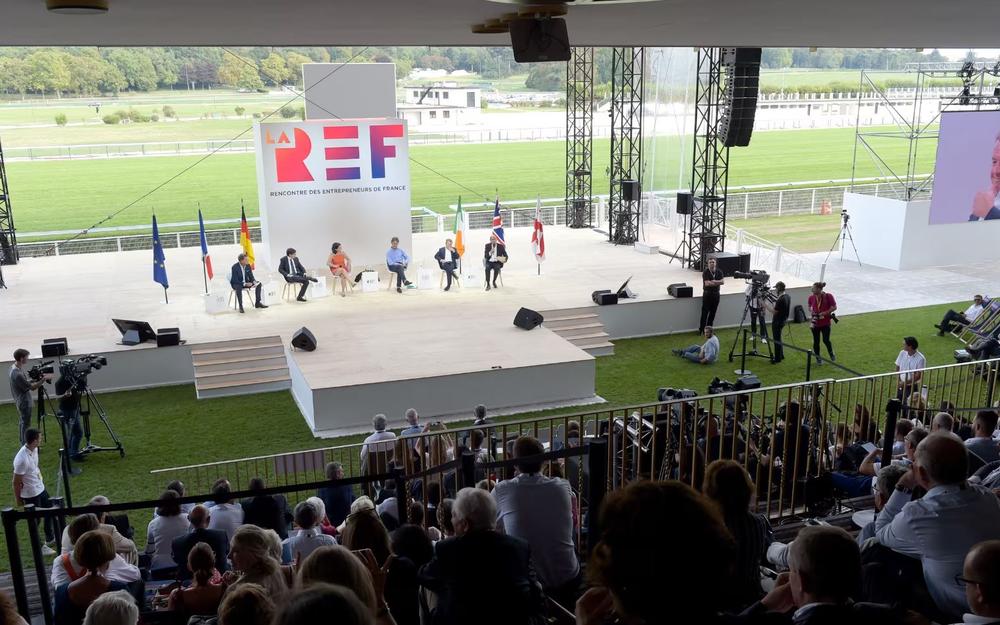In a context of economic debates often perceived as impoverished, Medef unveils an ambitious initiative to regain the upper hand in public discourse. Its “Economic Front” brings together business leaders and economists to energize the discussion around key themes such as innovation, investment, and decarbonization. Planned until 2025, this collective reflection aims to significantly influence the upcoming electoral deadlines, from municipal to legislative elections, while breaking free from preconceived ideas. Medef seeks to exert its weight on the political and economic stage, with the goal of refocusing public action in the face of a proliferation of regulations deemed constraining.
The Medef has initiated an Economic Front, gathering renowned business leaders and economists, with the goal of “bringing back rationality” into the economic debate. This project, announced during the Entrepreneurs of France meetings, aims to enlighten its members and influence public debate, while criticizing the poverty of the current political dialogue. In anticipation of upcoming electoral deadlines, such as the 2026 municipal elections, Medef plans to publish, in the summer of 2025, the results of its work on seven key themes to boost productivity and innovation. However, the economic climate presents challenges, such as a noticeable drop in industrial morale, particularly in the automotive sector.

Table des matières
ToggleMedef’s initiatives for the economic debate
Medef has launched an ambitious project aimed at influencing the economic debate in France. To this end, it has created an economic front bringing together business leaders, renowned economists, and think tanks. Among the participants are recognized figures such as Xavier Jaravel from the London School of Economics. Medef aspires to bring back rationality into the debate while criticizing a political class it views as disconnected from entrepreneurial realities, as shown by budget discussions often deemed strategically flawed, according to Patrick Martin, president of Medef. For more information, you can consult Medef’s proposals.
The strategic axes for the elections
In view of the 2026 municipal elections and potential early legislative elections, Medef is mobilizing to influence the debate. Seven key themes have been identified, each assigned to a duo of economists and business leaders. These themes include a variety of topics such as producing and innovating, working and compensating, and investing and decarbonizing. This work, the results of which are expected to be published in 2025, aims to present concrete proposals for the development of businesses and the French economic strategy. To better understand these initiatives, Medef invites you to consult their report on the French and European economic success available on their site For a French and European economic success.
Medef’s desire is also to reshape public action in the face of the multitude of regulations, particularly European ones, that could hinder innovation. In this regard, the organization remains open to broader discussions with other professional entities, although unions have not yet been consulted on these projects.
Assessing and adapting to current economic challenges
Medef is aware of contemporary economic challenges, such as the decline in industrial morale. The impact is particularly visible in the transportation and automotive sectors, with a significant drop in the business climate index. This context highlights Medef’s urgency to adapt its strategies, considering the changing economic environment. More information on evaluating tax credits can be found in their report Medef’s proposals.
Engagés pour nos métiers, fiers de notre jeunesse : le MEDEF se mobilise pour la compétition #WorldSkills et délocalise son conseil exécutif à Lyon pour soutenir @worldskills2024 ! Nous avons eu le plaisir à cette occasion d'échanger avec @laurentwauquiez.
— Mouvement des Entreprises de France (@medef) September 10, 2024
Le soutien du MEDEF à… pic.twitter.com/Csed78Xjyf





